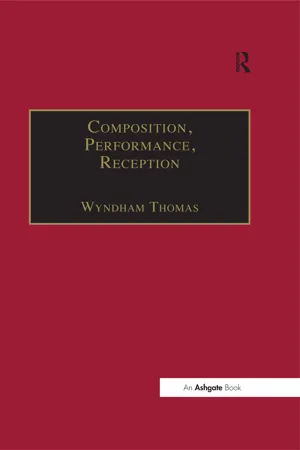
eBook - ePub
Composition, Performance, Reception
Studies in the Creative Process in Music
- 200 pages
- English
- ePUB (mobile friendly)
- Available on iOS & Android
eBook - ePub
About this book
Composers, performers, listeners, critics and theorists all play vital roles in the creation of music culture; yet often each group can appear to hold widely divergent views of a musical work's aims and effects. As the title indicates, this book examines the parts played by these groups and the interaction between them. In the first of eleven essays, Robert Saxton discusses the difficulty in pin-pointing the moment of inspiration for a new composition; while Raymond Warren looks at the problems facing operatic performers, including those that arise when interpretations are suggested by the libretto but not in the music. The changing perception of the composer's art from the 14th century to the present day is charted by Wyndham Thomas, in particular attitudes towards arrangement. Two quite different views of the performer's responsibility in communicating the composer's intentions are taken by Charles Rosen and Susan Bradshaw, the latter arguing for the need to bridge the gap between theoretical and practical analysis of a work; and in two fascinating case studies, Eric Clarke and Jennifer Davidson highlight the ways in which attention to movements of the body in performance can reveal aspects of musical structure. The reception of music is tackled from a variety of perspectives in the book. In his assessment of audience reaction to Jonathan Harvey'sThe Riot Adrian Beaumont concludes that our response is influenced by a complex web of expectations and previous musical experience. The influence of record sleeves in also determining a listener's response to music is discussed by Nicholas Cook; while Stephen Walsh and Adrian Thomas explore two milieux of critical reception - the first to the music of Stravinsky, and the second to works composed during the social-realist period in Poland. On a more personal level, Bojan Bujic's essay forms a fitting counterpart to Saxton's in his attempt to locate the ways in which we experience a new musica
Tools to learn more effectively

Saving Books

Keyword Search

Annotating Text

Listen to it instead
Information
Subtopic
MusicTable of contents
- Cover
- Half Title
- Title
- Copyright
- Contents
- Acknowledgements
- List of examples and illustrations
- Notes on contributors
- Preface
- Introduction
- 1 The Process of Composition from Detection to Confection
- 2 The Composer and Opera Performance
- 3 Composing, Arranging and Editing: A Historial Survey
- 4 A Performer's Responsibility
- 5 Freedom of Interpretation in Twentieth-century Music
- 6 The Body in Performance
- 7 Expectation and Interpretation in the Reception of New Music: A Case Study
- 8 The Domestic Gesamtkunstwerk, or Record Sleeves and Reception
- 9 Form and Forming: From Victorian Aesthetics to the Mid-twentieth-century Avant-garde
- 10 Stravinsky and the Vicious Circle: Some Remarks about the Composer and the Press
- 11 Mobilising our Man: Politics and Music in Poland during the Decade after the Second World War
- Index of names and titles
Frequently asked questions
Yes, you can cancel anytime from the Subscription tab in your account settings on the Perlego website. Your subscription will stay active until the end of your current billing period. Learn how to cancel your subscription
No, books cannot be downloaded as external files, such as PDFs, for use outside of Perlego. However, you can download books within the Perlego app for offline reading on mobile or tablet. Learn how to download books offline
Perlego offers two plans: Essential and Complete
- Essential is ideal for learners and professionals who enjoy exploring a wide range of subjects. Access the Essential Library with 800,000+ trusted titles and best-sellers across business, personal growth, and the humanities. Includes unlimited reading time and Standard Read Aloud voice.
- Complete: Perfect for advanced learners and researchers needing full, unrestricted access. Unlock 1.4M+ books across hundreds of subjects, including academic and specialized titles. The Complete Plan also includes advanced features like Premium Read Aloud and Research Assistant.
We are an online textbook subscription service, where you can get access to an entire online library for less than the price of a single book per month. With over 1 million books across 990+ topics, we’ve got you covered! Learn about our mission
Look out for the read-aloud symbol on your next book to see if you can listen to it. The read-aloud tool reads text aloud for you, highlighting the text as it is being read. You can pause it, speed it up and slow it down. Learn more about Read Aloud
Yes! You can use the Perlego app on both iOS and Android devices to read anytime, anywhere — even offline. Perfect for commutes or when you’re on the go.
Please note we cannot support devices running on iOS 13 and Android 7 or earlier. Learn more about using the app
Please note we cannot support devices running on iOS 13 and Android 7 or earlier. Learn more about using the app
Yes, you can access Composition, Performance, Reception by Wyndham Thomas in PDF and/or ePUB format, as well as other popular books in Media & Performing Arts & Music. We have over one million books available in our catalogue for you to explore.